Watching Pulp Fiction fires old synapses in my head that had gone dormant. Hearing these words and seeing these faces is like visiting old friends. This isn’t just because I’ve watched Pulp Fiction a bunch of times (though I certainly have), but also because Pulp Fiction’s style of characterization, offbeat dialogue, unexpected violence, and reliance on happenstance has heavily permeated cinema in the nearly three decades since.
The two big strengths of the movie are the screenplay and the acting, in pretty equal measure. It’s tough to find enough good things to say about either: The stars and curveball castings come in rapid fire, always oozing charisma. And the stuff they’re saying is typically electric, even (especially!) when it doesn’t mean much.
It’s hard to pick a favorite performance. Samuel L. Jackson gives some of the most bone-rattling line readings in film history, and John Travotla really inhabits his role of constipated interloper. I think, though, that Uma Thurman gets my vote: her fiery take on Mrs. Wallace is all sex and danger; you can’t look away when she’s on screen.

The verbal rhythms that Tarantino captures in his writing are ear candy. It’s so easy to get lost in the cadences and non-sequiturs of a scene. The little odd bits of personality that shine through give the story some sparkle (e.g. I love that the badass Wolf prefers his coffee with “lots of cream, lots of sugar”).
But there’s also a macro appeal to the script. The structure is an elliptical anthology that begs for you to cross-reference themes and plot points and character details. There’s just enough religious and literary allusions to hint at symbolism without ever delivering it in a tidy way, so you just want to keep digging and digging.
I do find that the film’s naughtiness has aged poorly. The constant racial epithets and misogyny might have felt subversive and jarring at one point, perhaps an indictment of the false sense of honor and respectability that we as a culture project on organized crime. But today it just feels tacky and tasteless, and not in a clever way. Or maybe I’m just maturing. (Tarantino’s cameo and liberal use of a certain slur is pretty damn distracting.)

I agree with the consensus that “The Gold Watch” is the weakest segment of the movie. It has the flattest characters and most troublesome and unpleasant dialogue, while the plot’s reliance on surprise timing borders on the wacky. Frankly, the sexual violence tilts the scale away from “sleazy fun” towards “outright crass” a little too far. But, like the rest of the movie, it still zooms by and has a gripping polish to it.
His acting notwithstanding, Tarantino emerges from this looking like a savant. His directing is nearly as bracing as his writing, with some truly fantastic shots and an inviting style throughout. The setting, while ostensibly contemporary America, is a bizarro mid-century salad of various stylized criminal worlds that you always want to see more of.
Pulp Fiction may be old hat, but, to me, it’s the good kind: A flawed but infinitely rewatchable masterpiece that has rightfully been canonized as a classic.
- Review Series: Top 100 (2009 List)
Is It Good?
Masterpiece: Tour De Good (8/8)
Awards, Honors, & Rankings
Dan is the founder and head critic of The Goods. Follow Dan on Letterboxd. Join the Discord for updates and discussion.

